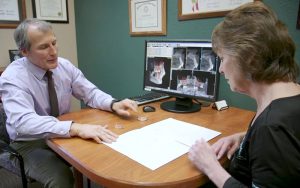Protecting Your Smile: Early Intervention for Gum Disease
Gum disease, also known as periodontal disease, is a progressive condition that can lead to tooth loss and other serious health complications if left untreated. Understanding the stages of periodontal disease and its symptoms is critical for early detection and effective treatment. To schedule an appointment, contact our dentist in Loveland, CO today by calling (970) 669-3918.
 Gum Disease Stages
Gum Disease Stages
Gingivitis
The earliest stage of gum disease is gingivitis, characterized by mild inflammation of the gums due to plaque buildup around the teeth. Key symptoms include:
- Bleeding gums
- Swollen gums
- Tender or sensitive gums
- Bad breath
- Receding gums
- Gum sensitivity
- Changes in gum texture
Fortunately, gingivitis can often be reversed with proper oral hygiene practices like brushing twice daily, flossing, and regular dental cleanings. If you notice signs of gingivitis, schedule an appointment with our dentist promptly. Early intervention can treat gingivitis effectively before it advances to more severe stages of gum disease.
Early Periodontitis
Without treatment, gingivitis can progress to early periodontitis, marked by a significant infection affecting the bone supporting the teeth. Symptoms include:
- Persistent bad breath
- Bleeding gums
- Swollen or red gums
- Gum recession
- Tooth sensitivity
- Loose teeth
- Formation of periodontal pockets
At this stage, bacteria penetrate deeper gum tissue and surrounding bone, causing irreversible damage and bone loss. Treatment may involve scaling and root planing to remove plaque and tartar from beneath the gum line and smooth tooth root surfaces.
Moderate Periodontitis
Moderate periodontitis is the third stage of gum disease, featuring significant bone loss and gum recession. Symptoms include:
- Deep gum pockets
- Gum swelling and redness
- Tooth migration or shifting
- Gum abscesses
- Chronic bad breath
- Changes in the bite
- Pain or discomfort while chewing

Treatment often involves scaling and root planing, antibiotic therapy, and possibly surgical intervention. Dentists may recommend a bone graft or guided soft tissue regeneration to regenerate lost bone and gum tissue.
Advanced Periodontitis
The final stage is advanced periodontitis, characterized by severe bone loss and tooth mobility. In this severe stage, teeth may need extraction, and extensive reconstructive procedures may be necessary to restore oral health. Symptoms include:
- Severe pain
- Tooth loss
- Gum inflammation
- Severe gum recession
- Pus discharge and painful abscesses
- Swollen or bleeding gums
Professional dental care is crucial if you’re experiencing symptoms of advanced periodontal disease.
Frequently Asked Questions
While more advanced stages of gum disease can’t be completely cured, they can be managed and controlled through proper oral hygiene practices and professional dental care. Early intervention can often reverse gingivitis, slowing or stopping the progression of gum disease.
Gum disease becomes irreversible in the second and third stages. To avoid moderate or advanced periodontitis, maintain good oral hygiene and visit the dentist regularly.
Yes, gum disease may be linked to systemic health conditions such as heart disease, stroke, and diabetes. Bacteria causing gum disease can enter the bloodstream, potentially causing inflammation throughout the body. Maintaining gum health is essential for overall health and well-being.
Are You at Risk for Gum Disease? Schedule a Consultation!
If you’re experiencing symptoms of gum disease or want to learn more about prevention, schedule an appointment with our Loveland, CO dentist today. Don’t let gum disease go untreated and risk serious health complications.
Call our office at (970) 669-3918 to schedule your consultation. We welcome patients from Evans, Campion, and Garden City.
